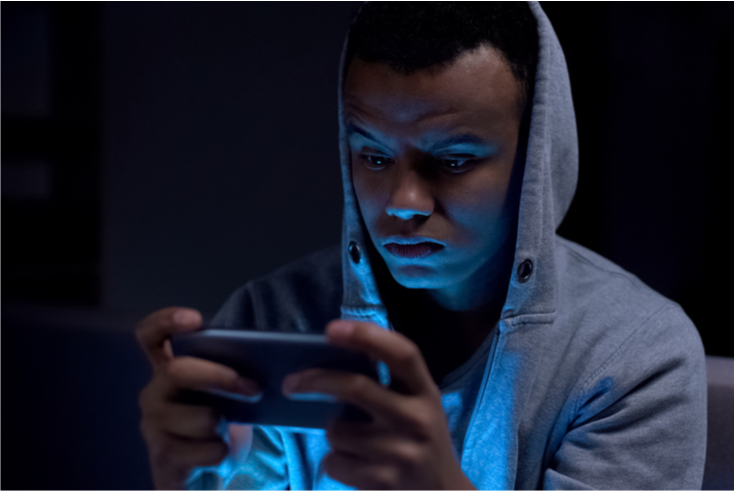The media sector is failing to support the mental health of black men

UM’s George McMahon dissects new research which reveals the impact negative stereotypes in media and advertising have on black and ethnic minority men
Black Lives Matter, the tragic death of George Floyd and the Covid-19 pandemic meant that 2020 was a huge year for bringing both racial equality and mental health to the forefront of the many issues facing society. Within that, the place of men and masculinity in particular was in the spotlight.
So UM teamed up with JOE Media and mental health charity Campaign Against Living Miserably (CALM) for the latest part of its UK By UM project, to find out whether men’s mental health issues, including depression and suicide, are linked to negative male stereotypes within media and advertising. One area of focus was black and BAME men.
If any brand or agency is wondering why this issue should matter to them, the survey highlighted that more than two-thirds (69%) of black men agree that the media industry has a significant role in defining how men are expected to act in society.
Plus, 40% – higher than the national average – say they would be more likely to buy from a brand that challenged traditional negative male stereotypes.
Not just angry young men
Our study found that half of young black men believe they face the stereotype of being “aggressive”, nearly twice as many as white men.
When we asked specifically what stereotypes exist of their ethnicity, a third of black men aged 18-24 said that “angry” and “ghetto” are prevalent in media, while the number of white men who felt they were seen as “angry” was less than half – and minimal for “ghetto”.
Similarly, black men felt they were far more likely to be stereotyped as “poor” and/or “uneducated”.
[advert position=”left”]
These false and harmful stereotypes play a part in how society views young black men in particular. Rapper and author Akala, for example, recently made the point that it is only ‘black-on-black’ crime that is reported as such… But “is the Mafia’s violence olive on olive?”.
This not only negatively affects the way white Britons view black men, but more importantly how black men view themselves.
The “aggressive” stereotype has been conflated by the legacy of ‘Gangsta’ rap music and the representation of black men in film and TV roles playing gangsters and criminals. Common signifiers across the media have in turn been reduced down by the tabloid press to the now familiar ‘roadman/rude boy’ archetype.
The value of positive role models to counter unhelpful representation cannot be overstated. When asked which male role models are breaking traditional male stereotypes, young black men over-indexed in choosing men from their own ethnicity, like Idris Elba and Marcus Rashford.
Mental health
It’s also important to note that this is not just an issue of encouraging black men to buy more of a brand’s products by avoiding harmful stereotypes in their ads.
The research found that more than half (51%) of black males think negative male representation in advertising does real psychological damage and three-quarters (75%) think that brands and advertisements should try and promote a more positive impression of men’s mental health.
A failure to do so can be devastating. Men hit a 20-year high in UK suicides in 2019 and the pandemic is not making things any better.
As Simon Gunning, CEO of CALM, notes: “The media must look beyond unhelpful gender norms such as ‘strong’ equating to silent. Simply allowing men to show vulnerability will go a long way to improve the situation.”
What can the industry do?
Outside of providing the right role models, how can we make sure that our industry does not enforce negative stereotypes about black men?
The key is to have black men as colleagues, peers and most of all, present in the decision-making for campaigns, whether in targeting, creative or publishing.
For years our industry has hidden behind the false pretence that we are inclusive, but in failing to make sure that we are teaching, hiring, and promoting black people, we will never have an ad or piece of media that is true to each and every culture.
Perhaps the best advice on how the sector can improve comes from three students at Brixton Finishing School, who recently wrote an open letter that called out adland. They queried whether it was talking a big game, but not fulfilling its promises when it comes to finding and nurturing talent from diverse cultures. Taking on their five recommended action points could be a huge step forward.
Aside from that, advertisers and the media need to do their research and show men in varied and realistic ways. Assuming that all black male millennials and Gen-Zers think and behave the same way, and creating ads that play to those stereotypes, is a recipe for failure.
The fact that stereotypes can also exacerbate a distorted view of those men among other Britons is a disaster waiting to happen.
The good news is that things are improving. The research found that more than half of black men think society has become better at accepting non-traditional male roles.
Now we just need to see even more ads and media campaigns that futureproof brands by reflecting those changes.
George McMahon is decision sciences manager at media agency UM




